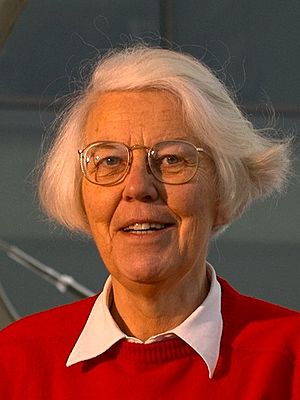Karen Spärck Jones facts for kids
Quick facts for kids
Karen Spärck Jones
FBA
|
|
|---|---|

Karen Spärck Jones in 2002
|
|
| Born | 26 August 1935 Huddersfield, Yorkshire
|
| Died | 4 April 2007 (aged 71) Willingham, Cambridgeshire
|
| Nationality | British |
| Alma mater | University of Cambridge |
| Known for | Term frequency–inverse document frequency |
| Spouse(s) | |
| Awards |
|
| Scientific career | |
| Fields | Computer science Information retrieval Natural language processing Document retrieval |
| Institutions | University of Cambridge |
| Thesis | Synonymy and Semantic Classification (1964) |
| Doctoral advisor | Richard Braithwaite |
Karen Spärck Jones FBA (26 August 1935 – 4 April 2007) was a pioneering British computer scientist responsible for the concept of inverse document frequency (IDF), a technology that underlies most modern search engines. In 2019, The New York Times published her belated obituary in its series Overlooked, calling her "a pioneer of computer science for work combining statistics and linguistics, and an advocate for women in the field." From 2008, to recognize her achievements in the fields of information retrieval (IR) and natural language processing (NLP), the Karen Spärck Jones Award is awarded to a new recipient with outstanding research in one or both of her fields.
Early life and education
Karen Ida Boalth Spärck Jones was born in [Huddersfield], Yorkshire, England. Spärck Jones was educated at a grammar school in Huddersfield and then from 1953 to 1956 at Girton College, Cambridge, studying history, with an additional final year in Moral Sciences (philosophy). She briefly became a school teacher, before moving into computer science.
Career
Spärck Jones worked at the Cambridge Language Research Unit from the late 1950s, then at Cambridge University Computer Laboratory from 1974 until her retirement in 2002. From 1999 she held the post of Professor of Computers and Information. Prior to 1999 she was employed on a series of short-term contracts. She continued to work in the Computer Laboratory until shortly before her death. Her publications include nine books and numerous papers. A full list of her publications is available from the Cambridge Computer Laboratory.
Her main research interests, since the late 1950s, were natural language processing and information retrieval. One of her most important contributions was the concept of inverse document frequency (IDF) weighting in information retrieval, which she introduced in a 1972 paper. IDF is used in most search engines today, usually as part of the term frequency–inverse document frequency (TF–IDF) weighting scheme. In 1982 she became involved in the Alvey Programme.
Honours and awards
An annual Karen Spärck Jones Award and lecture is named in her honour. In August 2017, the University of Huddersfield renamed one of its campus buildings in her honour. Formerly known as Canalside West, the Spärck Jones building houses the University's School of Computing and Engineering. Other honours and awards include
- Elected a Fellow of the British Academy (FBA), where she also served as Vice-President in 2000–2002
- Elected a Fellow of Association for the Advancement of Artificial Intelligence (AAAI) in 1993
- Fellow of European Association for Artificial Intelligence (ECCAI)
- President of the Association for Computational Linguistics (ACL) in 1994
- Gerard Salton Award (1988)
- Association for Information Science and Technology (ASIS&T) Award of Merit (2002)
- Association for Computational Linguistics (ACL) Lifetime Achievement Award (2004)
- BCS Lovelace Medal (2007)
- ACM - AAAI Allen Newell Award (2006)
- Association for Computing Machinery (ACM) Women's Group Athena Award (2007)
Personal life
Spärck Jones was married to fellow Cambridge computer scientist Roger Needham in 1958.
See also
 In Spanish: Karen Spärck Jones para niños
In Spanish: Karen Spärck Jones para niños

